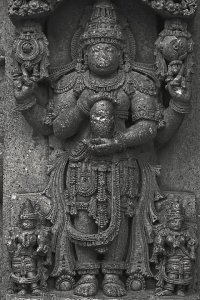Lord Shri Dhanvantari bhagwan is god of Medicines.
You can see history and other details of Shri Dhanvantari here at my another post--->
All Ayurveda lovers worship him....by this Sanskrit shlokas n prayers....
====>>>
" शंखंचक्रंजलौकांदधतममृतघटंचारुदोर्भिश्चतुर्भिः।
सूक्ष्मस्वच्छातिह्र्द्यांशुकपरिविलसन मौलिमम्भोजनेत्रम॥
कालाम्भोदोज्वलांगंकटितटविलसच्चारूपीताम्बराढयं।
वन्दे धन्वन्तरिं तं निखिल गदवन प्रौढदावाग्निलीलम॥ "
सूक्ष्मस्वच्छातिह्र्द्यांशुकपरिविलसन मौलिमम्भोजनेत्रम॥
कालाम्भोदोज्वलांगंकटितटविलसच्चारूपीताम्बराढयं।
वन्दे धन्वन्तरिं तं निखिल गदवन प्रौढदावाग्निलीलम॥ "
Meaning of this shloka--->>
"One who bears in his attractive four hands- conch, circular weapon,
a set of leeches and a pot with ambrosia,
whose fine, shining and pure upper garment
makes him appear especially wonderful,
whose eyes are like lotus flower,
whose bright bodily luster is of the colour of a fresh rain cloud,
whose beautiful waist is adored by a magnificent yellow dress
and who burns away all diseases...
just like a forest fire,
to such Lord Dhanvantari,
I bow respectfully"
a set of leeches and a pot with ambrosia,
whose fine, shining and pure upper garment
makes him appear especially wonderful,
whose eyes are like lotus flower,
whose bright bodily luster is of the colour of a fresh rain cloud,
whose beautiful waist is adored by a magnificent yellow dress
and who burns away all diseases...
just like a forest fire,
to such Lord Dhanvantari,
I bow respectfully"
===>>>
" ॐ नमः भगवतेय महा सुदर्शनाय
वासुदेवाय धन्वन्तरये I
अमृत कलश हस्ताय सर्व भय विनाशाय
सर्व रोग निवारणाय
त्रिलोक्य पथ्याय त्रिलोक्य नित्याय
श्री महा विष्णु स्वरूपा
श्री धन्वन्तरि स्वरूपा
श्री श्री श्री
औषधा ; चक्र नारायण स्वहा II "
वासुदेवाय धन्वन्तरये I
अमृत कलश हस्ताय सर्व भय विनाशाय
सर्व रोग निवारणाय
त्रिलोक्य पथ्याय त्रिलोक्य नित्याय
श्री महा विष्णु स्वरूपा
श्री धन्वन्तरि स्वरूपा
श्री श्री श्री
औषधा ; चक्र नारायण स्वहा II "
Meaning of this shlok--->>
"Obeisance unto the Supreme Bhagavan known as Sudarshana Vasudev Dhanvantari,
The holder of the Kalasha full of nectar of immortality,
Who removes all fears, who remove all diseases…
The well wisher of the three worlds,
And sustainer of the three worlds,
He is Vishnu swarup,
By the name Dhanvantari empowered to heal the Jiva souls."
====>>>
ॐ नमामि धन्वन्तरिं आदिदेवम I
सुरासुर वन्दिते पद पद्मम् II
लोके जरा रुक् भय मृत्यु नाशनम् I
धतर्मिशम् विविध औषधिनाम् II
सुरासुर वन्दिते पद पद्मम् II
लोके जरा रुक् भय मृत्यु नाशनम् I
धतर्मिशम् विविध औषधिनाम् II
Meaning is same as above said.
====>>>
वन्दे धन्वन्तरि पदयुगुलम्
स्वीकृतकार्ये फलसिध्द्यर्थम् ll
स्वीकृतकार्ये फलसिध्द्यर्थम् ll
बिभ्रत कलशम् अमृतपूर्णम्
चक्र जलौका तथा च शंखम् l
साक्षात् विष्णोर्भूमि अवतीर्णो
दातुं सौख्यप्रदानम् ll1ll
चक्र जलौका तथा च शंखम् l
साक्षात् विष्णोर्भूमि अवतीर्णो
दातुं सौख्यप्रदानम् ll1ll
वन्दे धन्वन्तरि पदयुगुलम्...
सर्वे सन्तु निरामया हि
नन्दतु जगति सदा आरोग्यम् l
मा कश्चित् ननु दुःखमाप्नुयात्
देयं सौख्यप्रदानम् ll2ll
नन्दतु जगति सदा आरोग्यम् l
मा कश्चित् ननु दुःखमाप्नुयात्
देयं सौख्यप्रदानम् ll2ll
====>>>
Listen this audio of Dhanvantari prayer in Sanskrit--->>
[youtube=http://www.youtube.com/watch?v=8VY-UOQ7O3Y&feature=related]





























